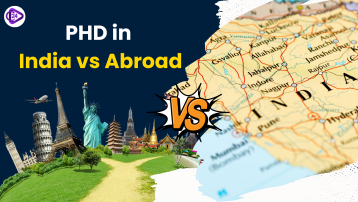IELTS Full Form 2025: Eligibility, Exam Pattern, Syllabus, Preparation Tips
.png)
IELTS Full Form 2025: Eligibility, Exam Pattern, Syllabus, Preparation Tips
The first well known standardized test is the International English Language Testing System (IELTS) which is used to examine the English language ability of nonnative speakers. That being said, for millions out there spanning from the desire to further education to immigrate, to other chances, the IELTS exam is one which you may not be able to get past. This article will delve deeply into IELTS exam pattern, IELTS syllabus, IELTS preparation and everything that is related to the exam, which will, in turn, help you in achieving your desired band score in IELTS.
What is IELTS?
The IELTS test will test your ability to listen, read, write and speak English. More than 11,000 other organizations such as universities, employers and immigration authorities in countries like the UK, Canada, Australia and New Zealand accept the IELTS exam. These test purposes are to provide IELTS Academic or IELTS General Training examination.
-
IELTS Academic: An excellent tool for students wishing to apply to a university or a professional institution.
-
IELTS General Training: Suited for immigration purposes or work-related opportunities
IELTS Full Form
IELTS stands for International English Language Testing System. The test is used to measure the level of English language proficiency of these non-native speakers and, in fact, it is one of the required tests for admission to universities, immigration and professional certifications.
IELTS 2025 Dates
The IELTS examination in 2025 is available multiple times(48 times a year), and it can be taken either in a paper pencil test or computer based test in India. Below is a detailed overview based on the latest information:
Paper-Based IELTS Test Dates 2025 India
-
Frequency: Up to 4 test dates per month, totaling 48 fixed test dates annually.
-
Schedule: Tests are typically held on Thursdays and Saturdays.
-
Modules: Academic module is available on all 48 dates; General Training module is available on approximately 24 dates.
-
Sample Monthly Dates (based on available data):
-
January: 3, 15 (Academic and General Training); 10, 24 (Academic only).
-
February: 7, 21 (Academic and General Training); 12, 26 (Academic only).
-
March: 7, 21, 28 (Academic and General Training); 14 (Academic only).
-
April: 5, 12, 24, 26 (Academic and General Training).
-
May: 3, 8, 17, 24 (Academic and General Training).
-
June: 6, 20 (Academic and General Training); 11 (Academic only).
-
July: 18, 25 (Academic and General Training); 2, 11 (Academic only).
-
August: 6, 22 (Academic and General Training); 1, 29 (Academic only).
-
September: 5, 19 (Academic and General Training); 10 (Academic only).
-
October: 3, 24 (Academic and General Training); 8, 17 (Academic only).
-
November: 5, 21, 28 (Academic and General Training); 14 (Academic only).
-
December: 12 (Academic and General Training); 3, 5 (Academic only).
-
Note: Specific dates may vary by city and test center. The official website of IDP IELTS will provide you with the details about the availability of IELTS in your desired city.
Computer-Delivered IELTS Test Dates 2025 (India)
-
Frequency: Available up to 7 days a week, 3 time slots daily, except on public holidays.
-
Modules: Both Academic and General Training are offered.
-
Flexibility: Candidates can choose a date and time slot that suits their schedule, with results available in 2–5 days.
-
Booking: Slots are available almost daily in major cities like Delhi, Mumbai, Bangalore, Chennai, Hyderabad, and others, subject to test center availability.
IELTS Eligibility 2025
The following is the eligibility for the IELTS exam in 2025: The IELTS requirements are quite easy and do not involve a lot of formalities and rigidity in regarding academic certification or some sort of professional document. Below is a concise overview based on the latest information:
IELTS Age Requirement:
-
Students need to reach sixteen years of age before joining the program.
-
Like the minimum age cutoff there can be no fixed upper age limit. age does not affect the application process.
IELTS Educational Qualification:
-
There are no specific training requirements or qualifications needed to take IELTS.
-
This system lets people study English and prepares them for both school and profession while also helping with immigration needs.
IELTS Identification Document:
-
You need to show both registration identification document and test day identification document which must remain valid throughout the test period.
-
The applicant must present their authentic passport which was issued within the last year and all data on this document should match the personal information provided.
-
For Indian test candidates a passport serves as their only accepted official identification document regardless of testing method.
IELTS Test Purpose:
Candidates can take the IELTS for various purposes, including:
-
Academic: For higher education (e.g., university admissions).
-
General Training: For migration (e.g., to Canada, Australia, UK) or work purposes.
-
IELTS for UKVI: For UK visa and immigration purposes.
-
IELTS Life Skills: For specific UK visa requirements (A1, B1 levels).
Anyone can enroll without prior work background or training achievements in their selected specialty area.
Health and Accessibility:
-
People with disabilities such as visual or hearing impairments or learning difficulties should submit their accommodation requests for special testing materials and time at least three months in advance.
-
When you sign up for IELTS testing with IDP or British Council test centers make sure to ask them about practical support options.
No Restrictions on Attempts:
-
Students take IELTS tests without any test limit.
-
Test-takers have one chance to retake the exam to get better results but need two or three months to prepare effectively.
IELTS Exam Pattern 2025
Understanding the IELTS exam pattern is crucial for effective preparation. The test consists of four sections: Listening, Reading, Writing, and Speaking, with a total duration of approximately 2 hours and 45 minutes. Below is a detailed overview of each section:
Here is the IELTS Exam Pattern discussed below:
|
Section |
Duration |
Tasks |
Scoring |
|
Listening |
30 minutes |
4 recordings, 40 questions (multiple-choice, matching, sentence completion) |
0–9 band score |
|
Reading |
60 minutes |
3 passages, 40 questions (multiple-choice, true/false, gap-fill) |
0–9 band score |
|
Writing |
60 minutes |
Task 1 (150 words), Task 2 (250 words) |
0–9 band score |
|
Speaking |
11–14 minutes |
3 parts (introduction, cue card, discussion) |
0–9 band score |
1. IELTS Listening Section
In the IELTS Listening Section, there are four recorded situations, monologues and conversations conducted in an overheard fashion. These recordings will later be answered by candidates. Some IELTS listening tips are to go through with various accents (British, Australian, American) and keywords.
2. IELTS Reading Section
IELTS reading section differs from IELTS academic to IELTS general training. It contains academics which includes articles from journals and from books, and General Training with texts from things like advertisements. Skimming and scanning techniques are very important for time management.
3. IELTS Writing Section
There are two tasks in the IELTS writing section:
-
IELTS Writing Task 1: A piece of academic writing and description for a graph, chart (and other types of visual information) in a formal environment, along with a letter for general training.
-
IELTS Writing Task 2: Write an essay on a given topic.
4. IELTS Speaking Section
IELTS Speaking Section is the face to face oral interview with the examiner. It covers three parts: general introduction, a cue card topic and discussion. Fluency, coherence and vocabulary are the main areas practiced in .IELTS speaking
IELTS Syllabus 2025
The English skills tested in this course are basically practical ones. Here’s a concise breakdown:
-
Listening: Comprehension of the main ideas, particular details, and the speaker’s intent is tested.
-
Reading: it is used to test the understanding of what has been read as well as vocabulary, and the ability to distinguish the arguments.
-
Writing: Evaluates task response, coherence, lexical resource, and grammatical accuracy.
-
Speaking: Measures fluency, pronunciation, lexical resource, and grammatical range.
Both IELTS General Training and IELTS Academic syllabus are the same; Reading and Writing are the only two sections that have minor differences between two modules.
IELTS Registration Process and Exam Fees
IELTS registration is an easy task that can be done online or at an authorized test centre. Follow these steps:
-
Visit the Official Website: Head to the British Council, Class24 StudyAbroad or any authorized partner’s website and visit the Official Website.
-
Create an Account: You then start your free account by entering your details and selecting your desired test date.
-
Choose Test Type: Choose IELTS Academic or IELTS General Training.
-
Select Test Mode: Choose between IELTS computer-based test or IELTS paper-based test.
-
Pay the Exam Fee: The IELTS exam fees may vary from country to country but roughly fall within US$215–250(₹18000-₹20000).
IELTS Exam Fee
Here is the IELTS Exam Fee discussed below:
|
Country |
IELTS Exam Fees (Approx.) |
|
USA |
$245–$255 |
|
UK |
£200–£220 |
|
India |
₹16,250–₹17,000 |
|
Australia |
AUD 410 |
Note: Fees may vary. Visit the official website for the updated information.
IELTS Study Material
Types of IELTS study materials are here, which will help you prepare for the exam.
1. Official IELTS Practice Materials
-
IELTS Official Practice Materials Book: It includes real exam questions, answers and explanations.
-
IELTS Practice Tests: These practice tests are available for download at the official IELTS website and simulate the actual test format.
2. IELTS Preparation Books
-
The presentation course in preparation for the Official Cambridge Guide to IELTS: A full guide to the Application, Academic and General Training.
-
Barron's IELTS Superpack: Practice tests, audio CDs, and study materials are included.
-
Target Band 7: IELTS Academic Module - How to improve your score: A practical guide to higher scores.
3. Online Platforms & Websites
-
IELTS.org: Tips, sample tests, and other resources on the official website.
-
Magoosh: Study plans, practice questions, and video lessons are offered.
-
IELTS Liz: Offers free video lessons, tips and preps.
4. Mobile Apps
-
IELTS Prep by British Council: Practice tests, tips and study materials are offered.
-
IELTS Test Pro: Practice tests and listening activities to download for offline use in a free app.
-
IELTS Vocabulary Builder: It works to improve your vocabulary for the exam.
5. YouTube Channels
-
IELTS Liz: Videos on each section of the IELTS exam, free of charge.
-
E2 IELTS: And full tutorials and strategies are also provided for each test section.
-
Academic English Help: I covered writing, speaking, and listening skills.
6. Practice Tests & Sample Papers
-
Cambridge IELTS series (Books 1-15): Actual past exam papers in a series of practice books.
-
IELTS Academic Test Practice: A free website which provides you free IELTS academic practice tests.
7. IELTS Speaking and Listening Practice
-
IELTS Speaking Practice Tests: In fact IELTS Speaking Band 9 is a website where we can find model answers and practice topics.
-
IELTS Listening Practice: On www.IELTS Liz or on YouTube, practice listening exercises.
8. Grammar and Vocabulary Resources
-
Firstly, we can turn our attention over to English Grammar in Use by Raymond Murphy. It's great for brushing up on your grammar.
-
Pauline Cullen's Vocabulary for IELTS A resource that can be a nice change to traditional vocabulary from academic texts (versus popular sources of vocabulary).
IELTS Exam Centers
IELTS test dates several times a month, up to 48 test dates a year. The British Council, IDP and other authorized partners operate IELTS exam centers all over the world – over 140 countries. Popular test centers include:
-
USA: New York, Los Angeles, Chicago
-
UK: London, Manchester, Birmingham
-
India: Delhi, Mumbai, Bangalore
-
Australia: Sydney, Melbourne, Perth
Be sure to book your test early since slots fill up really quick especially in peak seasons – January, July and September.
IELTS Score Validity and Band Scores
The validity of the IELTS test score is two years to the test date. Scores are reported on a scale of 0 to 9 in each part of the test, and an overall band score calculated as an average.
Here is the IELTS Score Validity and Band Scores discussed here:
|
Band Score |
Proficiency Level |
Description |
|
9 |
Expert User |
Full command of the language, accurate and fluent. |
|
7–8 |
Very Good/Good User |
Operational command with occasional inaccuracies. |
|
5–6 |
Modest/Competent User |
Partial command, likely to make errors but can handle basic communication. |
|
0–4 |
Non-User/Limited User |
Little to no ability to use English beyond isolated words or basic phrases. |
On average, universities require a band score of 6.5 – 7.5 but immigration authorities accept a band score of 5.5 – 6.5 depending on the visa they are looking at.
IELTS Preparation Plan & Strategy
It is necessary to structure the IELTS Preparation Plan well in order to get a high band score. Follow these steps:
1. Assess Your Current Level
Taking an IELTS mock test will allow you to assess where you currently stand and where you need to improve more, and will give you a clear direction of what you need to concentrate on to succeed in the real test.
2. Set a Target Band Score
By knowing what band score you need for achieving your goal (e.g. university admission or migration) you can concentrate your learning on exactly those areas that will have the most effect on your result.
3. Create a Study Schedule
It’s important to practice consistently for 6–8 weeks and strike a proper balance between all four sections, while spending a bit extra time on the areas where you are weak will serve you in many ways to improve your score further.
Here is a sample IELTS Study Schedule discussed here:
|
Week |
Focus Area |
Activities |
|
1–2 |
Listening & Reading |
Practice tests, vocabulary building |
|
3–4 |
Writing Task 1 & Task 2 |
Essay writing, graph description |
|
5–6 |
Speaking & Mock Tests |
Fluency practice, timed simulations |
|
7–8 |
Full-Length Practice & Revision |
Mock tests, review mistakes |
4. Use Quality Resources
Invest in IELTS books and resources along with:
-
The Official Cambridge Guide to IELTS
-
Barron’s IELTS
-
IELTS Practice Tests Plus by Cambridge
5. Join IELTS Coaching
In order to get personalized guidance, you can enrol in the best IELTS classes or IELTS online coaching. Platforms like Magoosh, British Council, and Class24 StudyAbroad offer expert-led courses.
6. Practice Regularly
As time passes go for IELTS mock tests in a week so that you can track the progress. Practice materials are available for free (such as IELTS Liz or IELTS Buddy) and have been gathered together over years and years.
IELTS vs TOEFL Which is Right for You?
The purpose, format, and scoring vary in both IELTS vs TOEFL, however, they evaluate English proficiency. Here’s a comparison:
Here is IELTS vs TOEFL comparison discussed here:
|
Feature |
IELTS |
TOEFL |
|
Full Form |
International English Language Testing System |
Test of English as a Foreign Language |
|
Format |
Paper-based or Computer-based |
Computer-based |
|
Scoring |
0–9 band score |
0–120 points |
|
Duration |
~2 hours 45 minutes |
~3 hours |
|
Speaking |
Face-to-face interview |
Recorded responses |
|
Acceptance |
UK, Australia, Canada, Europe |
USA, Canada, some UK institutions |
There are UK visas and Commonwealth countries which prefer IELTS while TOEFL is widely accepted in the USA. Select according to the target institution or country.
IELTS for UK Visa and Immigration
The IELTS for UK visa (IELTS UKVI) assessment test is intended for a particular version of the test that the United Kingdom government approves for UK immigration and visa applications. Conducted on the similar lines as the standard IELTS, at secure test centers. Requirements vary by visa type:
-
Student Visa: Minimum 5.5–6.5 band score.
-
Skilled Worker Visa: Minimum 4.0–5.0 band score.
-
Family Visa: Min 4.0 in speaking and listening.
Specific requirements will exist, which you can check on the UK government website.
IELTS Scholarships and Opportunities
There are many IELTS scholarships from universities that these international students can apply for if they have high band scores. For example:
-
British Council IELTS Award: Up to £10,000 for tuition fees.
-
Vary by region; from $1,000 to $5,000
Look through university websites or test providers for research scholarship opportunities.
Tips for Each IELTS Section
IELTS Listening Tips
-
Use podcasts to practice with accents or IELTS practice tests.
-
Listen to recordings with note keywords.
-
Get familiar and study about questions like name of the place or sentence completion.
IELTS Reading Tips
-
Skim practice to seek the main ideas rapidly.
-
Questions and passages have highlighted keywords.
-
Effective time management helps (20 minutes per passage).
IELTS Writing Tips
-
In describing trends, vary the vocabulary (‘skyrocketed’ instead of ‘increased’) when writing for IELTS Task 1.
-
The ideal thing to do is that for Planning to structure your writing(IELTS Writing task 2) spend 5 minutes.
-
Avoid informal language and contractions.
IELTS Speaking Tips
-
Practice answering common cue card topics such as to “Describe a memorable event”.
-
Make use of fillers such as ‘That’s an interesting question’ to buy time.
-
Doing it yourself is the best way to make progress on pronunciation and speaking fluently.
IELTS Computer-Based vs Paper-Based Test
There is a choice of the IELTS computer based test and the IELTS paper based test. Here’s a comparison:
Here is IELTS computer based test vs IELTS paper based test comparison discussed here:
|
Feature |
Computer-Based Test |
Paper-Based Test |
|
Delivery |
On a computer |
Pen and paper |
|
Results |
Available in 3–5 days |
Available in 13 days |
|
Typing Skills |
Requires basic typing proficiency |
Handwriting legibility matters |
|
Preference |
Faster for tech-savvy candidates |
Preferred by those comfortable with writing |
Both formats use identical content and scoring.
Conclusion
The IELTS exam is a gateway to global opportunities, from studying abroad to securing a visa. By understanding the IELTS exam pattern, mastering the IELTS syllabus, and following a structured IELTS preparation plan, you can achieve your target IELTS band score. Utilize IELTS mock tests, quality resources, and expert coaching to boost your confidence. Whether you choose the IELTS computer-based test or IELTS paper-based test, consistent practice and strategic preparation are key to success. Start your IELTS journey today and unlock a world of possibilities!
To enroll, online classes and offline classes contact or visit Class24 StudyAbroad.
IELTS Full Form FAQs
1. What are the IELTS eligibility criteria?
There is no specified eligibility required for IELTS. In order to be a candidate an individual must be at least 16 years old and have a valid passport. Anyone wishing to demonstrate English proficiency can apply.
2. How long is the validity of the IELTS score?
The validity of the IELTS score is two years from the date of the test. If your score expires, you will have to retake the test.
3. What is the difference between IELTS Academic and IELTS General?
IELTS Academic is for applying for higher education or professional registration while IELTS General Training is for emigrating or working purposes. On the other end, the writing section has a slight deviation.
4. Where can I find the IELTS test date and exam center?
Then check IELTS test dates and IELTS exam centers in your country on the British Council or on the IDP website. Book in advance so you may choose which slot to take.
5. Recommendations for any good IELTS books and resources?
Top IELTS books and resources do contain The Official Cambridge Guide to IELTS, Barron’s IELTS and online resources like IELTS Liz and Magoosh.
Contact Us
Recent Articles

Top 10 Medical Universities Abroad in 2025

Is English Sufficient for MBBS in Uzbekistan?
1.png)
MBBS in Uzbekistan for Under ₹20 Lakhs – Myth or Reality?

Visa Process For MBBS In Uzbekistan For Indian Students Step-By-Step Process 2025

PhD In India Vs Abroad: Comparison Of Scope, Cost, Quality & Career Opportunities
Cast Your Eyes Upon Our Newest Article

Top 10 Medical Universities Abroad in 2025
In order to study medicine at a foreign university, it is possible to access high-quality training, advanced research, and a career at the international level. With the increasing needs of skill...

Is English Sufficient for MBBS in Uzbekistan?
Is English Sufficient for MBBS in Uzbekistan? This is an ever growing question by international students, particularly among Indian students who are thinking of a medical degree overseas. Uzbeki...

Visa Process For MBBS In Uzbekistan For Indian Students Step-By-Step Process 2025
Visa Process for MBBS in Uzbekistan is one of the fastest and simplest processes and is a preferable choice for the Indian student who wants to study medicine in a foreign country. Uzbekistan ha...


